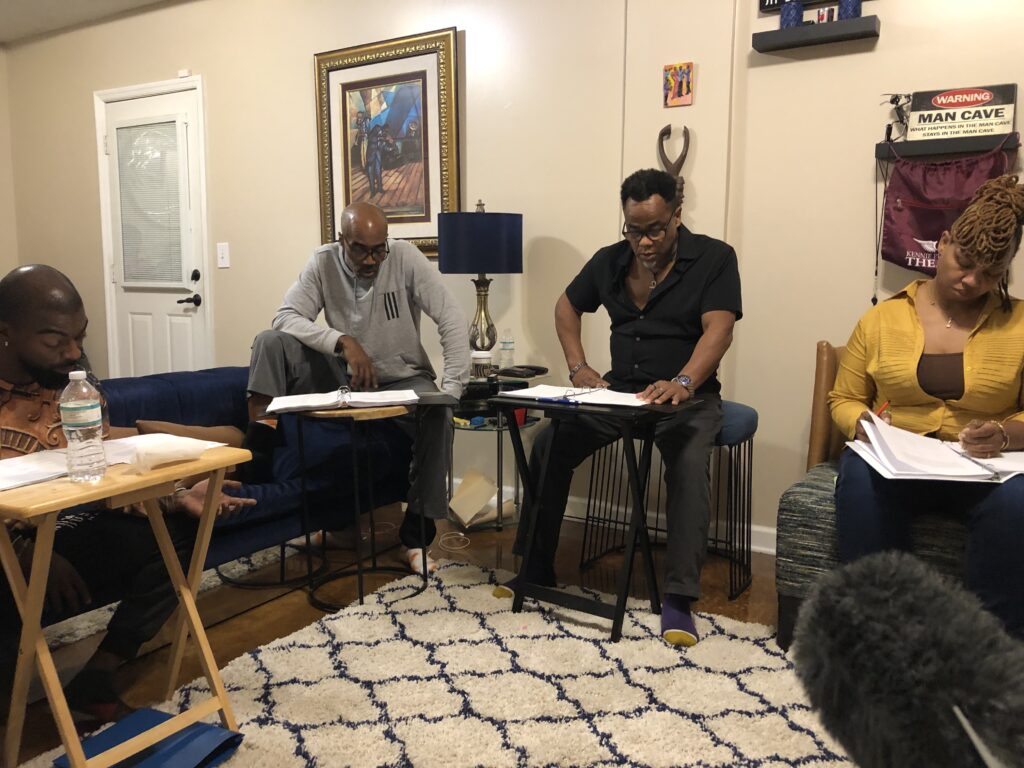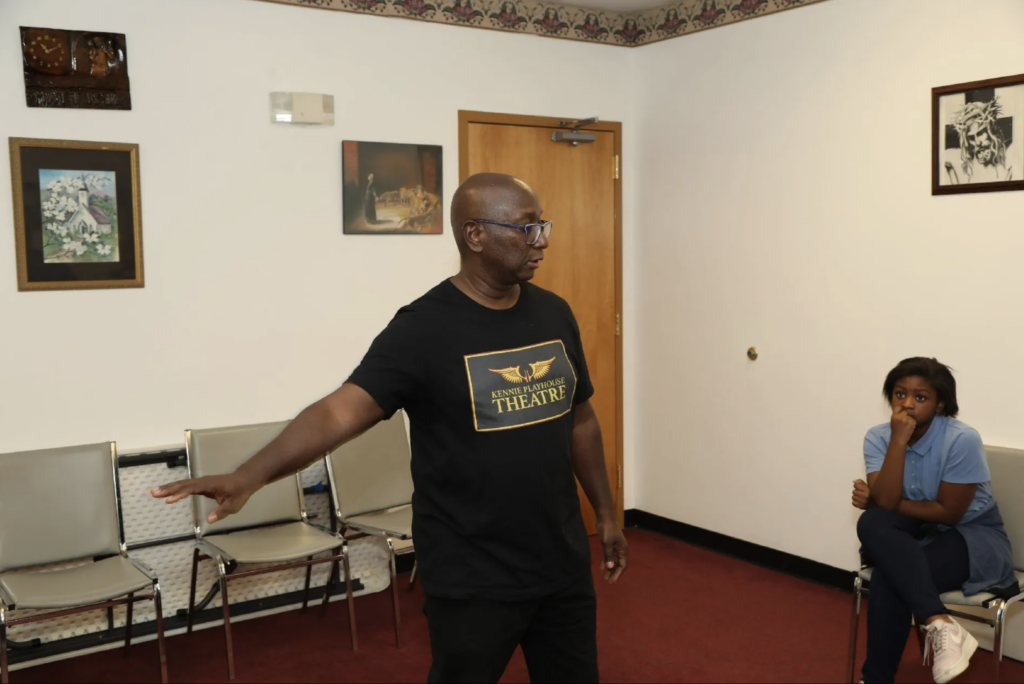
On a rainy Friday evening in late September, Kenny Dozier convenes a group of actors in the basement of his house. Everyone is sitting on couches in a warmly-lit room he calls the “man cave.”
On tonight’s agenda is a cold read of a play called ‘Broke-ology’ by Nathan Louis Jackson. In one scene, a husband and wife disagree on what to tell their kids about Santa.
“It ain’t right, baby girl. My brothers and sisters and I were all raised to believe that mom and dad who worked hard to get us gifts. Not some fat white man,” says the husband, played by actor Gray Washington Hemphill, III.
Dozier is the founder and director of his own company: Kennie Playhouse Theatre, which focuses on stories of the Black experience in the U.S. His situation is all too familiar for Nashville’s theatre organizations: the vast majority don’t own spaces to rehearse or perform in. That means sharing just a few venues, and sometimes leaves companies scrambling.
 Kennie Playhouse Theatre
Kennie Playhouse Theatre Kenny Dozier leads a play rehearsal. The founder of Kennie Playhouse Theatre says he often needs to rehearse in schools and churches.
To find rehearsal spaces, Dozier has needed to be scrappy – sometimes working out of his house, sometimes negotiating with schools and churches.
“I’ve been in cold places. I’ve been in dirty places. I’ve been in small places. I feel like sometimes I’ve been in closets,” he said. “We’ve rehearsed outside before. We’ve rehearsed at the Titans stadium outside.”
A steep price to pay
A survey from the Arts and Business Council found that nearly two thirds of arts organizations aren’t satisfied with the resources they have, and a third say a lack of space is their number one concern.
Right now, buying space isn’t really an option. Isabel Tipton-Krispin, director of the Nashville Shakespeare Festival, says even medium-to-large arts nonprofits can’t keep up with the growing city’s skyrocketing real estate prices.
In an email to WPLN, she wrote, “When I look online or call realtors out of curiosity about space, the price is many times over what we could responsibly budget.”
And price isn’t the only concern. Companies are looking for certain features that not every commercial building can offer. Drew Ogle directs the city’s largest theatre company, Nashville Repertory Theatre.
“If you think about the way a grocery store is built with a support beam every 12 feed, that would not be conducive to rehearsal space,” Ogle said. “Things like warehouses and empty space like that could make a good fit.”
The Rep is currently looking for a permanent location for rehearsals. It stages performances at the Tennessee Performing Arts Center (TPAC). Renting space there is expensive, but also means some costs are taken care of.
“We’re able to use their facilities and they’ve got great staff, box office, backstage crew and what have you,” Ogle says. “So in the end, it kind of balances out a little bit.”
All in this together
Smaller companies generally need a lower price than TPAC can offer. That means sharing just a few performance spaces in Nashville. Shawn Whitsell directs Destiny Theatre Experience. He usually stages his shows at the Darkhorse, a popular theatre venue on Charlotte Pike. But other companies need the space too.
“If there’s a time where I feel inspired to to create something or do a show, and the Darkhorse isn’t available, of course, I have to find another way to do it,” he said.
Still, Whitsell says he thinks the owner of the Darkhorse, Shannon Wood, truly understands the theater community and tries to support its needs. For example, she gives directors 24-hour access to the space during production week, just in case any last-minute problems arise.
“(She’s) just been great with keeping the Darkhorse affordable for small companies that don’t have a lot of funding,” he said. “Oftentimes she comes to our shows. We know her outside of just theater. We have relationship with her in other ways.”
In the absence of more money, that’s the best way to make up for the lack of space: relationships – with venue owners, and with other theater companies.
Dozier of Kennie Playhouse Theatre thinks the local government should play a role in that relationship too – by building more theaters.
“You have schools that are out there and not being utilized anymore; you have a lot of opportunity to create that. In Atlanta, they have places that are owned by the city that are theaters, all on different sides of town. And they’re really, really nice,” he said.
Metro Parks does run Looby Theater and the Centennial Black Box, but the city hasn’t announced plans to build any new theaters. However, there is a new privately-owned arts space in the works. Shelby Commons is a collaboration between the Arts and Business Council and Friends of Shelby Park. It will include a rehearsal and a performance space.
‘A Miracle’
Meanwhile, in an unexpected twist, Dozier’s company will soon be one of just a few in Nashville with its own space.
“It’s a miracle from God,” Dozier says.
Last summer, Dozier was left in the lurch after the venue for his youth theater camp canceled on him. On short notice, he found a pastor who was enthusiastic about hosting the camp. And the pastor’s church had an annex on the property it wasn’t using.
“It’s an older home, has a lot of character to it,” Dozier said.
And he’s already imagining the floorplan. He envisions the new space as one he can grow into — one with professional shows, plus acting classes for kids and adults.
“We want to open it up and make rooms where you can have rehearsals,” he said. “You can have a meeting here, again, a class here.”
In Nashville, there are dozens of other theatre artists who have ambitions like this — if only they had the space.

